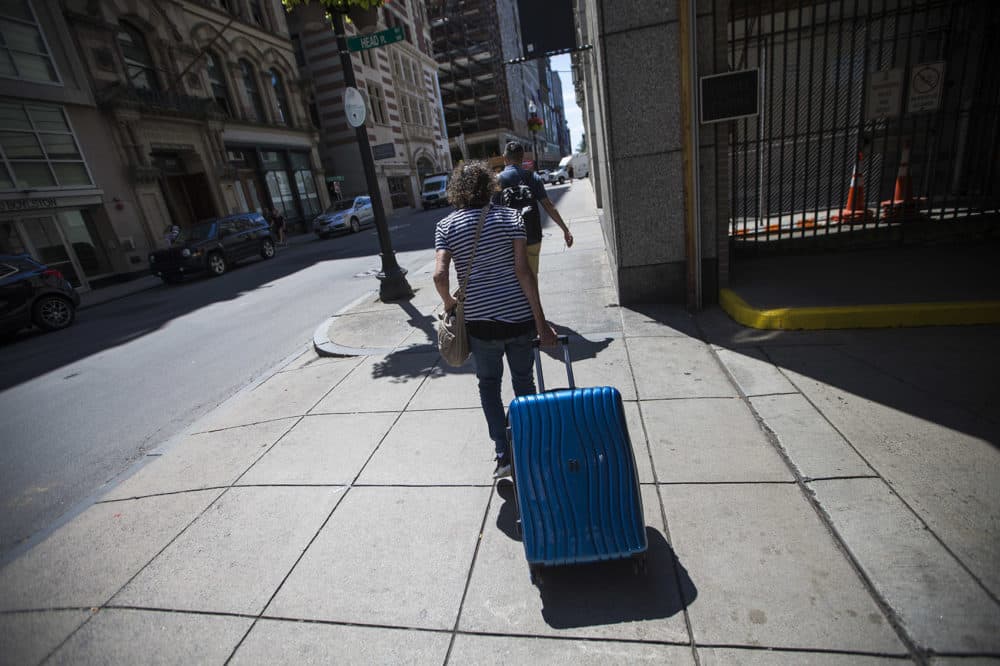Advertisement
Commentary
Hope For The Homeless And Sick

“Wait a minute, that name looks familiar,” my colleague said, pointing to my phone’s illuminated display. I was a first-year resident working in the emergency department one evening and had just shown her a select list of chronically homeless patients who were the most frequent users of Boston emergency departments.
I'd received the "HUES list" — High Utilizers of Emergency Services — earlier in the month from a friend who thought I could keep an eye out for patients on the list. It showed whether these homeless patients had a voucher for city-funded housing and if the city had found an apartment for them.
Think: the city’s Most Wanted list for homeless patients. This list is one of nearly a half-dozen separate housing lists that create a complex and disconnected patchwork of solutions that weave together the housing system in Boston.
One name, "Chris," stood out. The note next to his name showed that he had both a housing voucher and an apartment through the city.
My colleague pulled up the list of current patients in the emergency department on the computer — and there he was. The city had been trying to locate him. He happened to be in our department, at that moment, in room number 23.
We couldn't believe it. Moments later, when we told him, neither could he.
“Did you know you had an apartment?”
He looked at us as if we had three heads.
How many cases like Chris’s do hospitals currently miss?
Later during that shift, we contacted his case manager. While Chris was in the hospital, preparations were made for him to move in. He was discharged to his new home.
Chris’s case was the exception. He happened to have housing available and an effective outpatient case manager. The majority of patients struggling with homelessness have a different story. They wait on housing lists for years until housing becomes available. Even still, there are patients similar to Chris for whom housing is available — but sadly, hospitals that see them are none the wiser.
Most times, hospitals simply discharge patients like Chris back to the streets with a list of shelters and don't address their core issue: chronic homelessness.
How many cases like Chris’s do hospitals currently miss?
One too many. And yet, hiring housing specialists — workers trained in helping advance the housing status of the homeless — has been shown to lead to substantially higher rates of long-term housing permanency rates for the homeless.
Advertisement
The problem? Traditionally, housing specialists have only existed outside of hospitals in shelters or community outreach programs such as HomeStart Incorporated in Boston.
ER visits fell 68% and inpatient stays fell by 77% after the first year ...
But that is beginning to change. Around the country, a growing number of housing specialists are being deployed by hospitals and are helping to advance the housing status of our nation’s homeless.
In the short term, these hospital-based housing specialists are trained in helping patients navigate transitional housing, finding temporary housing or shelter housing. In the long term, these specialists help patients maneuver through the complicated web of siloed services and get patients off the streets and into permanent supportive housing.
In California, Housing For Health recently created a program that includes these specialists. Their preliminary results? ER visits fell 68% and inpatient stays fell by 77% after the first year of the program.
Another California organization, Hospital Harbor Interfaith Services, partnered with South Bay Hospitals to create a similar housing specialist position that helps hospital social workers navigate the complex housing system for their patients.
The results were markedly positive after only one year of implementation, leading partnering hospitals to fund the program for an additional three years.
California is not alone in this endeavor. In New York, Mt. Sinai Health Systems recently hired a housing specialist to help hospitalized patients transition to permanent housing while Vanderbilt University Medical Center also implemented a housing specialist in 2016 that works with their homeless patients.
Even the health insurer, United HealthCare, is employing housing specialists to work with hospitals in Texas, Washington and throughout the Midwest.
This paradigm shift of addressing housing status in the hospital is significant because homeless individuals are three times more likely to visit an emergency department and five times more likely to be admitted to inpatient hospital units than the average patient. Proponents argue that it might actually be one of the best locations to find the homeless since it is often difficult to locate them on the streets.
Further, this shift can not only help reduce rates of homelessness but could also help curb health care costs. One study showed that homeless patient admissions cost $2,559 more than housed patient admissions. Emergency department visits themselves are approximately $3,700 per patient visit, amounting to $18,500 in emergency department costs for the average homeless patient per year.
With hospital-based housing specialist positions slowly sprouting across the nation, Boston hospitals must follow course. From 2007 to 2018, the state witnessed a 33% increase in homelessness, with a more recent growth of 14.2% from 2017 to 2018, accounting for the largest absolute increase in the U.S.
Community organizations such as Boston’s Public Health Commission and Boston Health Care for the Homeless Program will continue to form a pillar for combating homelessness in our city, but hospitals must now rise to the occasion and tackle one of our nation’s most tragic challenges. Treating homelessness like any other medical problem by connecting homeless patients to the specialists they need most is one way of doing so.
In return, hospitals could see reduced costs and patients could see a second chance at life.
Dr. Alister Martin is an emergency physician in Boston who writes about the intersection of medicine, public policy and behavioral economics. David Velasquez is a third-year medical student at Harvard Medical School interested in public policy, with a focus on health insurance and housing.